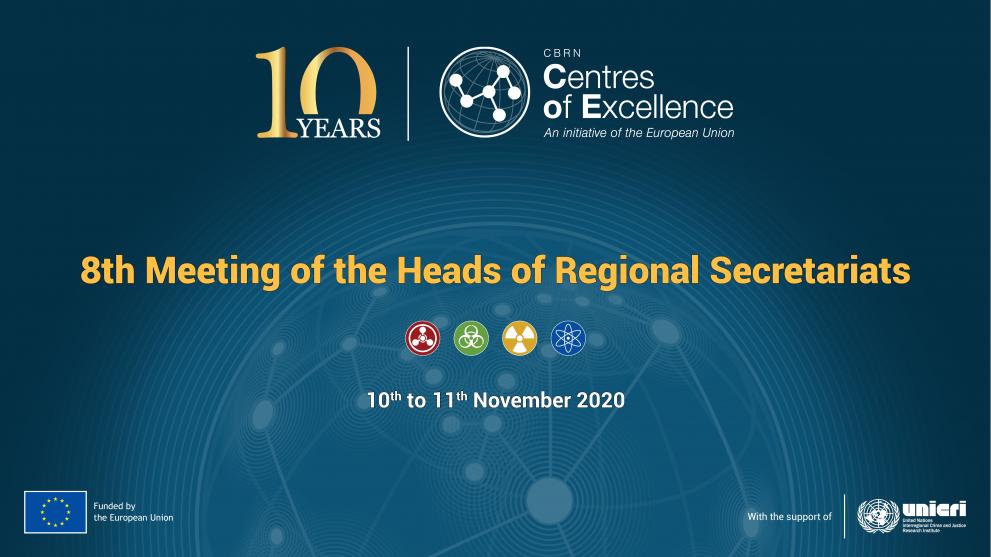
On 10 and 11 November 2020, the 8th Global Meeting of the Heads of Regional Secretariats of the EU CBRN Risk Mitigation Centres of Excellence Initiative took place.
In view of the COVID-19 pandemic this was the first time for the meeting, which is normally held in Brussels, to take place in virtual format. The meeting took stock of CBRN activities and priorities across the eight regions worldwide where the CBRN Centres of Excellence Initiative is active. In 2020, the CBRN CoE Initiative is marking its 10th anniversary.
Olivier Luyckx, the Head of Unit of DEVCO B.5, opened the meeting by mentioning that the worldwide threat posed by dangerous CBRN agents and materials remains high. During the past year, there have been several incidents involving the nerve agent Novichok (in particular the Navalny case, which has been widely publicised in the media) as well as the use of chemical agents (mustard gas) in Iraq and Syria.
With the onset of the COVID-19 pandemic, the EU CBRN CoE Initaitive adapted its strategy for 2020 and is now focusing a substantial part of its efforts on helping to address this biological threat.
The Mobile Lab Offensive for Africa, namely LABPLUS Africa (Project 85), was launched in July 2020, working together with the Pasteur Institute in Dakar on strengthening laboratory capacities for detection and surveillance in Senegal and other Partner Countries across Africa.
In his address to the 8th Heads of Secretariat meeting, Pawel Herczynski, the EEAS Managing Director for CSDP and Crisis Response, mentioned that the CBRN CoE Initiative has done a remarkable job in overcoming some of the obstacles created by the COVID-19 pandemic.
This is clear from the many webinars, round-table meetings and trainings seminars organised online during the past months, many of which have focused on the COVID-19 pandemic. The Initiative has adapted very well to the new environment.
The Managing Director recalled that the CoE Initiative was conceived ten years ago to help prepare Partner Countries for tackling unpredictable situations, such as the outbreak of an epidemic disease.
The CBRN CoE Initiative has put in place structures and networks in Partner Countries, in particular CBRN National Focal Points (NFPs), National CBRN Teams and Regional CBRN Secretariats. These structures as well as capacities built are being used during the current COVID-19 crisis.
In this sense, the CBRN CoE Initiative has proven to be robust and resilient.
Henriette Geiger, the Director DEVCO B, concluded the meeting and stated: "The ongoing COVID-19 pandemic has shown how important the basic concept underlying the CBRN CoE Initiative is, as the CoE Initiative has helped put in place the necessary structures and promoted the necessary trust, which is enabling Partner Countries to work together to tackle the threat of COVID-19".
Details
- Publication date
- 11 November 2020
- Author
- Directorate-General for International Cooperation and Development
- Location
- Brussels
- CoE Region
- AAF - African Atlantic Façade
- CA - Central Asia
- ECA - Eastern and Central Africa
- GCC - Gulf Cooperation Council Countries
- MIE - Middle East
- NAS - North Africa and Sahel
- SEA - Southeast Asia
- SEEE - South East and Eastern Europe
